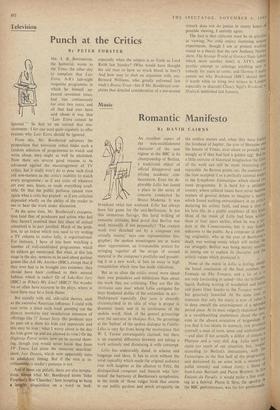Music
Romantic Manifesto
By DAVID CAIRNS
AN excellent aspect of the non-establishment character of the new regime at the BBC is its championship of Berlioz, a traditional object of official disapproval and pitying academic con- descension. Even the de- plorable Lelio has found a place in the series of concerts conducted by Bruno Maderna. It was broadcast twice last weekend. Lelio has always been fair game for the anti-Berliozians. Is not this monstrous farrago, this lurid striking of romantic attitudes, final proof that Berlioz was mad, musically if not personally? 'The craziest work ever sketched out by a composer not actually insane,' says one representative bio- grapher; the spoken monologues are at worst sheer opportunism, an irresponsible pretext for stringing together all the scraps of unused material in the composer's portfolio and present- ing it as a new work, at best an essay in high romanticism which time has made ridiculous.
But as so often the critics reveal more about their own prejudices and inhibitions than about the work they are criticising. They are like the 'ecrivains sans dine' whom Lao castigates for their blinkered dislike of the unfamiliar in art— Shakespeare especially. Our taste is absurdly circumscribed in its idea of what is proper in dramatic music and in its intolerance of the spoken word; think of the genteel grimacings over the narrator in Oedipus Rex, the groanings at the 'bathos' of the spoken dialogue in Fidelio. Lelio is very far from being the masterpiece that W. J. Turner extravagantly claimed; but there is an essential difference between not taking a work seriously and dismissing it with contempt.
Lelio has undesirably dated, in scheme and language and ideas. It has to exist without the vivid topicality which made the original audience roar with laughter at the allusion to Fdtis, the distinguished composer and theorist who 'cor- rected' the harmony of Beethoven's symphonies, in the simile of 'those vulgar birds that swarm in our public gardens and perch arrogantly on • the noblest statues and, when they have fouled the forehead of Jupiter, the arm of Hercules and the bosom of Venus, strut about as proudly and smugly as if they had laid a golden egg.' But IV a little exercise of historical imagination the fail' of the work can still be made interesting -and enjoyable. As Barzun points out, the audience of the time accepted it as a perfectly rational seclucl to the Symphonic Fantastique which shared the same programme. It is hard for a philistine country where cultural issues have never become matters of general debate to imagine a society which found nothing extraordinary in an artists declaring his artistic faith, and even a slice of his love life, in a public manifesto of this klitcl. Most of the music pf Leif° had been written three or four years earlier, when he was a stn dent at the Conservatoire, but it was largell. unknown to the public. As a composer of alarm" ing originality, who in the year of Beethovens death was writing music which still strikes the ear strangely, Berlioz was being merely sensible in setting out to explain its character and the artistic values which produced it. nt None of the music in Lelio is .boring. exce r the banal conclusion. of the final number. the Fantasia on The Tempest, and a lot of it is not only fascinating in sound–like the brilliantly liquid, flashing scoring of woodwind and b°1.1)5 and piano (four hands) in the Tempest music-- but genuinely beautiful. \At the sane time I" maintain that only the music is now of value is to deny oneself the entertainment of a splendid period piece. At its most vulgarly rhetorical there is a swashbuckling exuberance about the text' even in the absurd evocation of brigandage. If you find it too idiotic to stomach, you proclaim yourself a man of taste, sense and sophistical —and also, if not actually a defiler of statues. 3 Pharisee and a very dull dog. Lelio need not claim too much of our attention; but, 'stagecl according to Berlioz's instructions, with the Fantastique in the first half of the progralinne; and declaimed by an actor with a mixture 01. pallid intensity and robust irony, a blend of Jean-Louis Barrault and Pierre BrOSSCUI in Les Enfants du Paradis, it would make a line even" ing at a festival. Pierre le Save, the speaker in the BBC performances, was far too gentlemanly














































 Previous page
Previous page